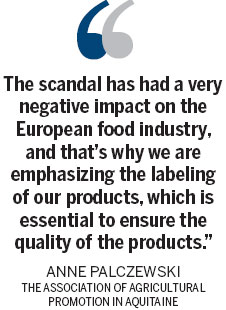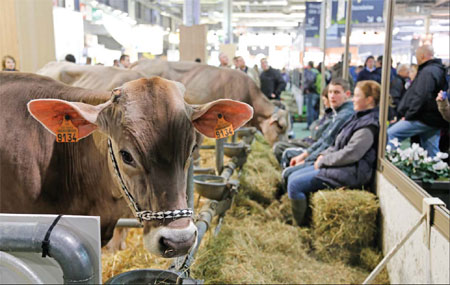Taking the quality route to success
Updated: 2013-03-01 09:14
By Li Xiang (China Daily)
|
|||||||||||
|
The Paris International Agricultural Show opened on Feb 23 amid the horsemeat scandal across Europe. Li Xiang / China Daily |
French agricultural product makers eye booming Chinese market to grow sales
Reeling from the fallout of the European horsemeat scandal, France's agricultural producers are beginning to emphasize labeling and traceability, and some are hoping this will help them gain access for their products to China.
 |
"The scandal has had a very negative impact on the European food industry, and that's why we are emphasizing the labeling of our products, which is essential to ensure the quality of the products," said Anne Palczewski, a spokeswoman for the Association of Agricultural Promotion in Aquitaine province, southwestern France.
"We have initiated a project with Wuhan, capital of Hubei province, which will start in July as our first step in bringing our farmers' products to the Chinese market."
As the horsemeat scandal continued to unfold over the past week, the 10-day Paris International Agricultural Show, the largest of its kind in France, opened.
French President Francois Hollande inaugurated the Paris agricultural show in a move aimed at restoring consumer confidence in the country's food sector. France has Europe's largest agricultural industry with gross output of 71.4 billion euros in 2011, the French National Institute of Statistics and Economic Studies says.
In his speech, Hollande called for compulsory labeling and traceability of meat used in processed foods to prevent a repeat of the horsemeat scandal. France would encourage voluntary initiatives to improve labeling while waiting for the European legislation, he said.
On display at the show are typical French food and agricultural products ranging from foie gras, wine and meat to dairy products.
The Aquitaine government has invested more than 2 million euros to set up stores called the House of Southwest France to promote local agricultural products ranging from wine, pork, chicken and oyster to Chinese consumers, said Didier Duffas, partner of Chen Di Partners, a consulting firm that helps regional authorities in France promote their agricultural products in China.
A 700-square-meter store will be first opened in Wuhan, which is a twin city of Bordeaux, southwestern France. The regional government will invest more to add additional stores in Beijing, Shanghai, and Chengdu, capital of Sichuan province, Duffas said.
"The concept of the store is to provide Chinese consumers an opportunity to taste and try French foods while ensuring the quality and originality of the products," he said.
"The products are directly shipped from the local farmers who have signed agreements with French authorities to ensure the originality of the products. We have also set up an authentication system through which the end consumer in China can trace and check the information of the products with a mobile phone or on a website. It's like a DNA database through which consumers can check and match."
Meanwhile, French dairy producers are also aiming to boost their exports to China, where consumers are looking for safe and high-quality products after a series of sandals that have hurt the credibility of domestically produced dairy products.
"China is a top priority for us today, and we are looking for partnerships in China to help distribute our products, which is something we won't be able to achieve with others," said Guillaume Ribadiere, export director of Terra Lacta, a mid-size French dairy cooperative with revenue of 620 million euros in the region of Poitou Charentes.
Ribadiere said the company is considering ultra-high temperature milk as a way of entering the Chinese market because it has long shelf life, making it particularly suitable for overseas markets.
The company is also targeting the high-end niche market of cheese and butter in China and is working on new recipes to extend the shelf life of its cheese and butter in order to ensure the quality of products during transport, Ribadiere said.
"Our strategy is to build a brand among local chefs and focus on business-to-business clients in China. We don't aim to have the cheapest product but rather good value-added products at reasonable prices."
The French infant formula producer Laiterie de Montaigu, a partner of the Chinese dairy firm Biostime, is also beefing up investment in new factories to increase its production capacity in order to supply the Chinese market. The company will invest 35 million euros on a new plant which will add the total production capacity to 25,000 metric tons of milk powder by the end of next year, said Eric Blanchard, general manager of Laiterie de Montaigu.
"We have a lot of demand from China. The market is going for quality and for more specific products for each individual case.
"So we are focusing on research and introducing innovative technology to raise quality by reducing the impact on ingredients and nutrition during processing."
lixiang@chinadaily.com.cn
(China Daily 03/01/2013 page3)
Today's Top News
List of approved GM food clarified
ID checks for express deliveries in Guangdong
Govt to expand elderly care
University asks freshmen to sign suicide disclaimer
Tibet gears up for new climbing season
Media asked to promote Sino-Indian ties
Shots fired at Washington Navy Yard
Minimum growth rate set at 7%
Hot Topics
Lunar probe , China growth forecasts, Emission rules get tougher, China seen through 'colored lens', International board,
Editor's Picks

|

|

|

|

|

|






